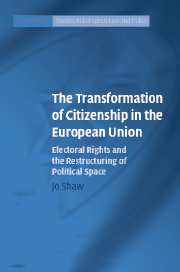 The Transformation of Citizenship in the European Union
The Transformation of Citizenship in the European Union from PART III - The contestation of electoral rights in the Member States of the European Union
Published online by Cambridge University Press: 05 June 2015
Introduction
As part of a general discussion of electoral rights for non-nationals, Tables 3.1 and 3.2 in Chapter 3 highlighted the states in which electoral rights have, and have not, been granted to some or all resident third country nationals. In this and the following two chapters, some of the stories behind those tables are picked up and discussed in more detail to draw out the processes of transformation and institutional forms which any reconfigurations of citizenship and citizenship practices have taken in that context. However, while the presentation is focused on the processes of transformation which have occurred at the national level, the discussion should not be seen in isolation from the developments that have occurred within EU law, which have been presented in the previous four chapters. Many of the same themes on immigration and immigrant inclusion picked up from the perspective of EU policy-making in Chapter 7 recur when the issues are viewed from the perspective of the Member States. Thus electoral rights at the national level should not be seen in isolation from the influence of EU law, including EU policies on the treatment of both EU citizens and third country nationals. Where appropriate, the contrast is made in this chapter and the two which follow between the specific case of Article 19(1) EC local electoral rights for EU citizens, and the broader cases of local electoral rights for all non-nationals as enacted in some states under national law or as denied in others. Certainly, there are many cases of the direct and indirect influence of the EU electoral rights upon the development of electoral rights under national law, as well as evidence of the influence of national law upon EU law.
In Chapter 3, I outlined some of the arguments typically used to provide a grounding in democratic theory or theories of rights for the extension of the boundaries of the suffrage beyond national citizens alone to include resident non-nationals.
To save this book to your Kindle, first ensure [email protected] is added to your Approved Personal Document E-mail List under your Personal Document Settings on the Manage Your Content and Devices page of your Amazon account. Then enter the ‘name’ part of your Kindle email address below. Find out more about saving to your Kindle.
Note you can select to save to either the @free.kindle.com or @kindle.com variations. ‘@free.kindle.com’ emails are free but can only be saved to your device when it is connected to wi-fi. ‘@kindle.com’ emails can be delivered even when you are not connected to wi-fi, but note that service fees apply.
Find out more about the Kindle Personal Document Service.
To save content items to your account, please confirm that you agree to abide by our usage policies. If this is the first time you use this feature, you will be asked to authorise Cambridge Core to connect with your account. Find out more about saving content to Dropbox.
To save content items to your account, please confirm that you agree to abide by our usage policies. If this is the first time you use this feature, you will be asked to authorise Cambridge Core to connect with your account. Find out more about saving content to Google Drive.